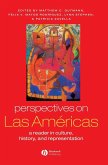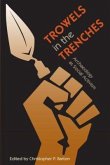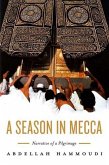We Share Walls: Language, Land, and Gender in Berber Morocco explores how political economic shifts over the last century have reshaped the language practices and ideologies of people in the plains and mountains of rural southwestern Morocco. Through an entrenched moral code that favors male emigration, women have come to personify the rugged homeland and embody its native language - Tashelhit. They create frameworks in which knowledge of rural land, people, and expressive culture is positively valued. In contrast, national narratives centered on Arab identity marginalize Berbers yet immortalize Berber women as remnants of an idealized past. Through close analysis of verbal and song-texted forms, We Share Walls is a richly textured ethnography of anxiety and temerity among an overlooked Muslim group. Hoffman documents language choices and consequences in public and private contexts, providing insight into the everyday strategies Moroccan Berbers use to accommodate themselves to an Arabic-speaking society while retaining their own distinctive identity. With its fascinating semiotic and gender issues simmering beneath the surface, this engaging book will be of interest to scholars and students of anthropology, performance studies, sociolinguistics, and gender studies.
Hinweis: Dieser Artikel kann nur an eine deutsche Lieferadresse ausgeliefert werden.
Hinweis: Dieser Artikel kann nur an eine deutsche Lieferadresse ausgeliefert werden.
"In vivid prose, this breakthrough book portrays howMorocco's Berber women and men - in remote villages andtowns, on radio, and in schools - use language as a keyelement to shape how they 'belong' in Moroccan societytoday and in the process reshape the idea of 'center'and 'periphery'."
Dale F. Eickelman, Dartmouth College
"Katherine Hoffman is a gifted ethnographer and hernuanced account of language, gender, poetry, and place in BerberMorocco resonates with the rich sensory texture of livedexperience. Her chapter on radio is alone worth the price ofadmission - a pioneering work of media ethnography inlinguistic anthropology."
Richard Bauman, Indiana University
"With compassion and intellectual acuity, Hoffman'sstudy of the Berber-speaking Ishelhin of Southern Morocco evokes asociety where the spoken word has molded a deep attachment toplace. Her observations glow with the intensity of livedexperience, distilled from a total immersion in the land, language,and people of this remote region. Using speech, poetry, and song askeys to understanding social process, We Share Wallsrepresents a major contribution to contemporary Moroccan Studiesand to the wider field of ethnolinguistics."
Susan Gilson Miller, Harvard University
"A beautiful and deeply researched ethnography that elucidateshow performance genres like talk, song, and poetry create a senseof place and a particularly Berber (and gendered) response tomodernity."
Deborah Kapchan, The Tisch School of the Arts, New YorkUniversity
"A richly detailed study of the changing politics of language inMorocco. Hoffman deftly shows how Berber women's everyday labourkeeps alive the homeland and mother tongue that are the chargedobjects of migrant men's nostalgia and identity. This is linguisticanthropology at its best, and broadest."
Lila Abu-Lughod, Columbia University
"At last we have an account of Berber Morocco that probesspace, culture and people in a highly sensitive and eloquent style.Hoffman brings to the forefront a long marginalised language and analmost forgotten community. This is indeed ethnography at its best.Readers will be inspired by the breadth and depth ofHoffman's treatment."
Enam Al-Wer, University of Essex
"An excellent in-depth study of the gender and languagedynamics in Berber communities. A highly readable and timelyaddition to the emerging and promising scholarship on language,gender and women in Morocco."
Fatima Sadiqi, Harvard University
Dale F. Eickelman, Dartmouth College
"Katherine Hoffman is a gifted ethnographer and hernuanced account of language, gender, poetry, and place in BerberMorocco resonates with the rich sensory texture of livedexperience. Her chapter on radio is alone worth the price ofadmission - a pioneering work of media ethnography inlinguistic anthropology."
Richard Bauman, Indiana University
"With compassion and intellectual acuity, Hoffman'sstudy of the Berber-speaking Ishelhin of Southern Morocco evokes asociety where the spoken word has molded a deep attachment toplace. Her observations glow with the intensity of livedexperience, distilled from a total immersion in the land, language,and people of this remote region. Using speech, poetry, and song askeys to understanding social process, We Share Wallsrepresents a major contribution to contemporary Moroccan Studiesand to the wider field of ethnolinguistics."
Susan Gilson Miller, Harvard University
"A beautiful and deeply researched ethnography that elucidateshow performance genres like talk, song, and poetry create a senseof place and a particularly Berber (and gendered) response tomodernity."
Deborah Kapchan, The Tisch School of the Arts, New YorkUniversity
"A richly detailed study of the changing politics of language inMorocco. Hoffman deftly shows how Berber women's everyday labourkeeps alive the homeland and mother tongue that are the chargedobjects of migrant men's nostalgia and identity. This is linguisticanthropology at its best, and broadest."
Lila Abu-Lughod, Columbia University
"At last we have an account of Berber Morocco that probesspace, culture and people in a highly sensitive and eloquent style.Hoffman brings to the forefront a long marginalised language and analmost forgotten community. This is indeed ethnography at its best.Readers will be inspired by the breadth and depth ofHoffman's treatment."
Enam Al-Wer, University of Essex
"An excellent in-depth study of the gender and languagedynamics in Berber communities. A highly readable and timelyaddition to the emerging and promising scholarship on language,gender and women in Morocco."
Fatima Sadiqi, Harvard University








